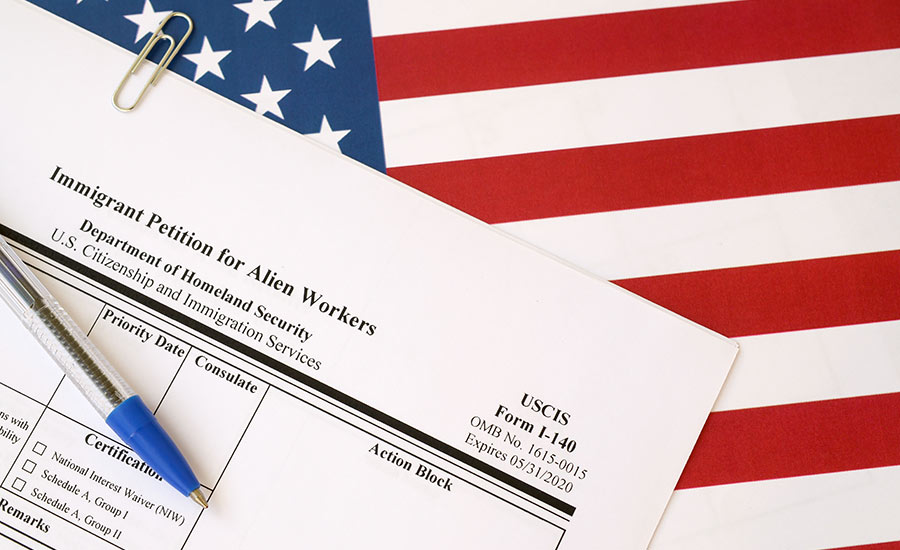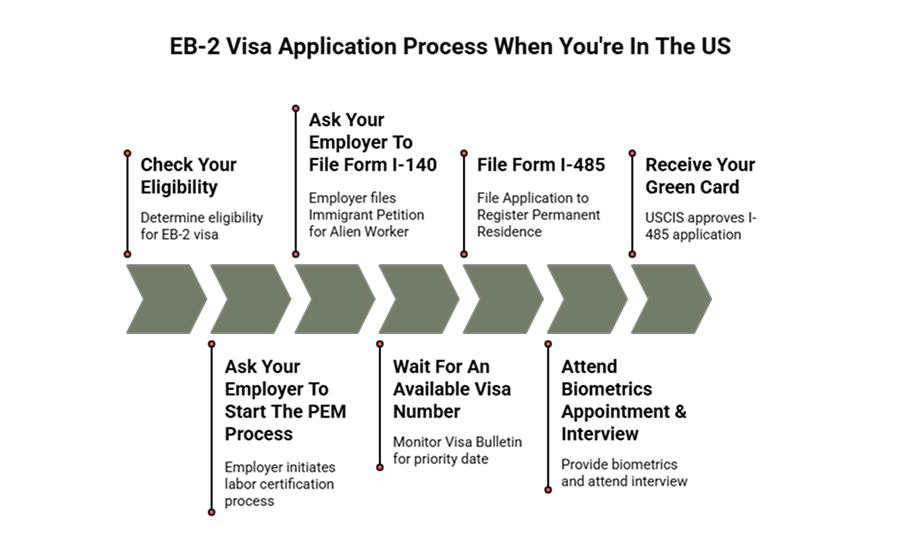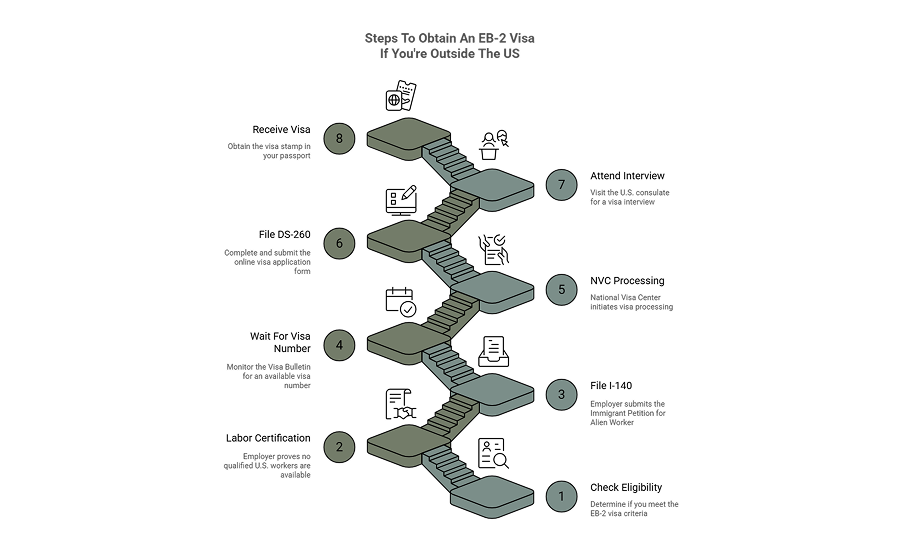

EB-2 Visa: Key Takeaways
- You may qualify for an EB-2 visa if you hold an advanced degree or have exceptional skills in your field of expertise
- EB-2 visa holders can apply for a Green Card to become permanent residents
- EB-2A and EB-2B categories require PERM labor certification, which can make the process longer
- You can apply for an EB-2 visa from inside or outside the U.S., following different steps
Every year, the United States welcomes people with exceptional skills, advanced degrees, and a passion for contributing to its economy.
If you’re dreaming of living and working in the U.S., you may be eligible for an EB-2 visa.
We’ll break down:
- What the EB-2 visa is and who qualifies
- The key requirements and documents you’ll need
- The step-by-step application process
- How long it takes
EB-2 Visa Explained
An EB-2 visa is an employment-based visa designed for individuals who have advanced degrees or show exceptional ability or skill in their profession.
It aims to attract highly skilled and talented people around the world to contribute to the U.S. economy and workforce.
An EB-2 visa provides multiple benefits to its holders, including:
- Employment authorization: You’re free to work in your area of expertise, opening doors for promotions and career growth.
- A path to permanent residency: You can apply for lawful permanent residence (a Green Card) and later, for U.S. citizenship.
- Dependent visas: You are allowed to bring your spouse and unmarried children under 21 years of age to the U.S. under EB-2 derivative visas.
- Work flexibility: You can change jobs within the same field or occupation, provided you continue to work in their area of expertise.
- Access to U.S. healthcare and education: You and your dependents have access to the U.S. healthcare system and can enroll your children in U.S. schools.
- Potential for entrepreneurship: You can start your own business in the U.S.
Depending on the applicant, an EB-2 visa can be divided into three subcategories:
- EB-2A: Advanced degree holders
- EB-2B: Individuals with exceptional ability
- EB-2C: National Interest Waiver (NIV) applicants
The EB-2A and EB-2B applicants generally require the U.S. employer sponsor to complete the Permanent Labor Certification (PERM) labor certification process to prove there are no qualified U.S. workers for the role, making the process more lengthy and complex.
EB-2C visa holders can avoid the labor certification process that is typically required for employment-based visas, which significantly expedites the visa application process.
Who Can Apply For An EB-2 Visa?
Those eligible for an EB-2 visa include:
- Advanced degree holders (applying for an EB-2A visa): This subcategory is meant for those who have a Master’s degree from a U.S. institution or a Bachelor’s degree and five years of progressive work experience in their field.
- Individuals with exceptional ability (applying for an EB-2B visa): This subcategory is for those who have exceptional ability in their line of work, including science, art, business or athletics.
- National Interest Waiver applicants (applying for EB-2C visa): This subcategory is for individuals who can provide evidence that their work can be beneficial for one of five vital national interests of the U.S. in various spaces, such as health, economy, education, culture or other areas of national interest significance.
What Are The Requirements For An EB-2 Visa?
The requirements for EB-2 visa applicants vary depending on the subcategory under which applicants are applying.
EB-2A Visa: Advanced Degree Applicants
Advanced degree applicants need to prove that they possess:
- An advanced degree or foreign equivalent degree
- A Bachelor’s degree and 5 years of progressive work experience
Documents that can serve as evidence for advanced degree applications typically include:
- Transcripts and diplomas
- Educational evaluations (if the degree is from a foreign institution)
EB-2B Visa: Exceptional Ability Applicants
Exceptional ability applicants need to prove that they:
- Possess expertise in business, sciences or arts
- Provide services which are sought by an U.S. employer
- Meet labor certification requirements
Documents that can serve as evidence for exceptional ability applications typically include:
- Awards and recognitions
- Published articles or scholarly papers
- Evidence of significant achievements
- Membership in professional organizations
- Letters of recommendation from experts in the field
- Any other relevant documentation highlighting the applicant’s exceptional abilities
EB-2C Visa: NIW Applicants
Although there is no set formula defining how an applicant can benefit the national interest, based on previous cases, NIW applicants need to prove that they:
- Can provide skills, services or products beneficial to the national economy
- Can contribute to improving environment and use of national resources
- Can aid U.S. government agencies through their knowledge or skills
As evidence to support NIW applications, they can present:
- A detailed description of the applicant’s work and its impact
- Letters of recommendation from experts in the field
- Evidence of significant contributions to the field
- Examples of how the applicant’s work will benefit the U.S. economy, culture, health, education or another area of national interest
- Any other relevant documentation supporting the national interest claim
How To Apply For An EB-2 Visa From Within The US
The process for applying for an EB-2 visa differs based on whether the applicant files their petition from within or outside the U.S.
To apply for an EB-2 visa from within the U.S.:
1. Check Your Eligibility
Determine if you meet the eligibility criteria for an EB-2 category based on exceptional ability, advanced degree or National Interest Waiver.
2. Ask Your Employer For A Labor Certification
If a labor certification is required for your visa subcategory, ask your sponsoring employer to initiate the labor certification process with the U.S. Department of Labor (DOL). The aim of this process is to demonstrate the unavailability of qualified U.S. workers relative to the expertise you have.
3. Ask Your Employer To File Form I-140
Once your employer obtains a labor certification, they will need to file Form I-140, Immigrant Petition for Alien Worker, with the U.S. Citizenship and Immigration Services (USCIS). This form establishes your eligibility for the EB-2 visa.
When they file the petition, USCIS will issue a receipt notice (Form I-797C), confirming that the application has been received and is being processed (find information on USCIS receipt notice delivery times).
4. Wait For An Available Visa Number
Keep an eye on the Visa Bulletin: your priority date determines when a visa number opens up.
5. File Form I-485
File Form I-485, Application to Register Permanent Residence or Adjust Status, with the USCIS. If your application is approved, you can adjust your status to a lawful permanent resident.
6. Attend Biometrics Appointment & Interview
Attend a biometrics appointment to provide fingerprints and other personal information. You may also be asked to sit for an interview with USCIS.
7. Receive Your Green Card
If USCIS approves your I-485 application, you will receive lawful permanent resident status (a Green Card), allowing you to live and work in the U.S.

EB-2 Application Process From Outside The US
To apply for an EB-2 visa from outside the U.S.:
1. Check If You Are Eligible For An EB-2 Visa
Determine if you are eligible for an EB-2 visa in any of the subcategories.
2. Ask Your Employer To Start The Labor Certification Process
If your EB-2 visa subcategory requires a labor certification, your employer will have to prove to the U.S. Department of Labor that they cannot find qualified U.S. workers in the area in which you are a specialist.
3. Ask Your Employer To File Form I-140
At this stage, your employer will submit Form I-140, Immigrant Petition for Alien Worker to establish your eligibility for the EB-2 visa.
4. Wait For An Available Visa Number
Your I-140 petition will be given a priority date by USCIS. Keep an eye on the Visa Bulletin to see when a visa number for your category and country becomes available.
5. Wait For The National Visa Center To Process Your Visa Petition
Once a visa number becomes available, the National Visa Center (NVC) will initiate visa processing. The NVC will send you a letter notifying you of the required fees and documentation you need to submit, along with details about filing Form DS-260.
6. File DS-260
Complete and file Form DS-260 online, providing detailed information about your background, family, employment, and travel history. Pay the required visa processing fees by following the NVC’s instructions.
7. Attend Your Visa Interview
Visit the U.S. consulate or embassy in your home country, where a consular officer will review your application and conduct a visa interview.
8. Receive Your Visa
If your application is approved, you will receive an immigrant visa stamp in your passport. After entering the U.S., you will receive your lawful permanent resident card via mail.

EB-2 Visa Processing Time
The EB-2 visa processing time can vary greatly and depends on several important factors.
One of the biggest factors is whether your subcategory requires PERM labor certification, which typically takes between 14 and 22 months.
Once the labor certification is approved, your employer must file Form I-140.
- For applicants with advanced degree and exceptional ability, it takes between 7 and 10 months.
- For applicants requesting a NIW, it’s between 13 and 17 months.
Finally, you must wait for a visa number to become available based on your priority date and country of chargeability. If there is a backlog for your country, this can add several months or even years to your wait time.
Start The EB-2 Visa Process With Spar & Bernstein
Navigating each of the EB-2 subcategories can be a challenge, due to the various requirements and the evidence needed.
That’s where our experienced team at Spar & Bernstein comes in. Tackling all areas of immigration law, from employment and family immigration to citizenship and naturalization, we have a list of success stories that continues to grow.
Our team will:
- Provide expert guidance tailored to your unique circumstances.
- Assess your eligibility and determine the most suitable EB-2 subcategory for your qualifications.
- Help you gather and organize the documentation required to support your case.
- Prepare and submit your application, ensuring all required forms and supporting materials are filed accurately.
- Guide you through the adjustment of status process or consular processing to secure your Green Card.
Defending your interests as our own, our dedicated attorneys will work tirelessly to help you achieve your goals and continue your journey toward permanent residency in the U.S.
EB-2 Visa: FAQs
What is the difference between EB-2 and EB-3 visas?
The EB-2 visa is for people with advanced degrees or exceptional ability, while the EB-3 visa is for skilled workers, professionals, and other workers with at least two years of experience.
Does every EB-2 visa require PERM labor certification?
No, typically EB-2A and EB-2B require PERM, while the EB-2C NIW lets you skip this step.
Can I change jobs on an EB-2 visa?
Yes, if you continue working in your field of expertise. If you’re changing employers before getting your Green Card, your new employer may need to file a new petition.





